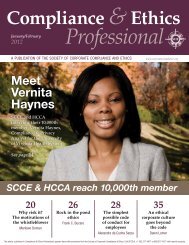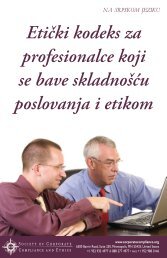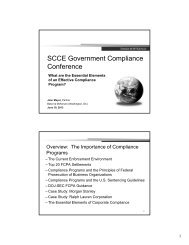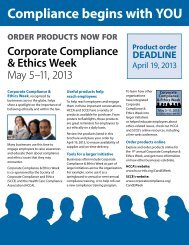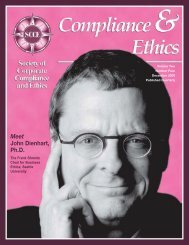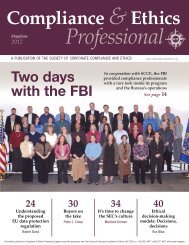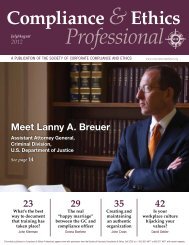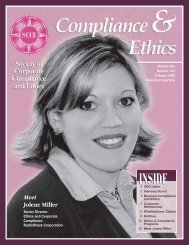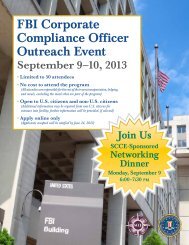Compliance & Ethics Professional - Society of Corporate ...
Compliance & Ethics Professional - Society of Corporate ...
Compliance & Ethics Professional - Society of Corporate ...
- No tags were found...
You also want an ePaper? Increase the reach of your titles
YUMPU automatically turns print PDFs into web optimized ePapers that Google loves.
evaluate, compensate, and sometimes fire theCEO. Does a CEO’s presence on the board (orworse, a position as chairman <strong>of</strong> that body)conflict with the board’s obligations to acton behalf <strong>of</strong> the organization’s stakeholders,investors, and others? Does the CEO’s presenceon the board compromise the board’sintegrity or, equally legitimate, create anappearance <strong>of</strong> a compromise to the reasonableobserver?Independence is a special case <strong>of</strong> applyingthe principle <strong>of</strong> fairness. If I am to be fairin the exercise <strong>of</strong> my duties and obligations,then I ought not be influenced by the impact<strong>of</strong> my actions on my personal wants or needs.I ought to be able to make decisions as a boardmember independent <strong>of</strong> concern for WIIFM(What’s In It For Me?).Can independence be absolute?Can I ever make a decision without consideringwhat will happen to me as a result <strong>of</strong> thatdecision? In a word, no! Every business decisionany board member makes is conflicted,because it is subject to the external influence<strong>of</strong> potential personal loss or gain. If I am aboard member and choose to do X—anythingat all—and my sole basis for choosing X is thatI truly believe it to be the very best thing to d<strong>of</strong>or the company, am I free from conflict or theappearances <strong>of</strong> conflict?Perhaps not. If it is good for the companyand I am board member, doesn’t that improvethe odds that it is good for me too? If the decisionmakes the company more pr<strong>of</strong>itable,safer, more efficient, better respected, or moresuccessful by any measure, then I may be recognizedas having contributed to that success.I get to keep my board position. I continue todeserve and earn the respect <strong>of</strong> my peers. Iam acknowledged as having contributed. Myshares increase in value. All <strong>of</strong> these outcomesaccrue to me and all <strong>of</strong> them are <strong>of</strong> value tome, thus I gain from my decision.Sanford Krolick suggested in his bookEthical Decision Making Style 1 that there arefour sets <strong>of</strong> criteria that are considered everytime any member <strong>of</strong> an organization at anylevel (up to and including members <strong>of</strong> theboard) considers a business action or makes abusiness decision. To paraphrase Krolick:··Pragmatic considerations: What are thebusiness consequences <strong>of</strong> this action ordecision?··Altruistic considerations: What impactwill this action or decision have on othersor my relationship with them?··Idealistic considerations: What is the rightthing to do, as defined by the values andprinciples that apply to this situation?··Individualistic considerations: What willhappen to me as a consequence <strong>of</strong> thisaction or decision?If we focus on the individualistic, wemay argue that it is difficult (perhaps impossible)to consider any decision as whollyindependent. The argument states that inevery decision, the person acting experiencessome individual consequences. Even a whollyunselfish act <strong>of</strong> doing for others may leave aresidue <strong>of</strong> satisfaction, joy, or comfort in theperson committing the act, or may result inothers noting the action and finding it admirableor praiseworthy. A similar claim couldbe made that there is an individualistic elementin any act <strong>of</strong> idealism or pragmatism.No matter what we do, there is a personalconsequence and there may be a personalbenefit, even if wholly “internal” to thedecision-maker.If this is an accurate description <strong>of</strong>human psychology, and I believe it is, thenwe cannot escape the reality that everyaction and decision has the potential forpersonal impact. Therefore, absolute independence(e.g., 100% altruism, pragmatism,and/or idealism untainted by individualism)is a myth.<strong>Compliance</strong> & <strong>Ethics</strong> <strong>Pr<strong>of</strong>essional</strong> March/April 2012+1 952 933 4977 or 888 277 4977 | www.corporatecompliance.org 45




